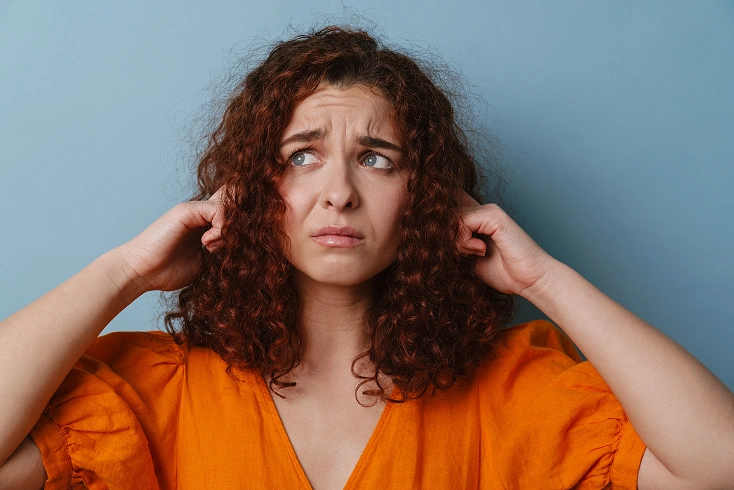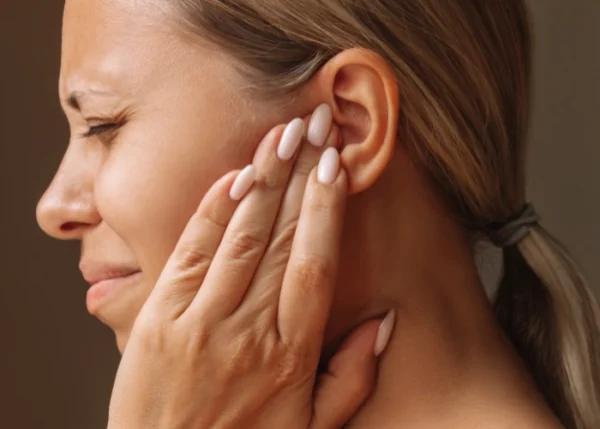Symptoms Explained: Itchy Ears and Perimenopause
By Ashley Nowe
Published:

You know that feeling, when something itches and all you can think about is how desperate you are to scratch it?
“I can’t stand it!”
Or what about when your ears – specifically around the canal – itch so much it’s distracting…And now, for some reason, since you’ve hit your forties (give or take) it seems to happen all the time?
Are itchy ears a sign of perimenopause? Yep. Add itchy ears to the list of weird menopause symptoms.
“I thought it was just me!”
It’s also on the list of menopause symptoms no one really talks about.
Itchy ears can be a symptom of perimenopause and menopause, even though it doesn’t seem like ears have anything to do with your reproductive system. Like so many, many things related to perimenopause though, the itchy perimenopause ears is likely tied to a decline in estrogen.
Why Are My Ears So Itchy All the Time?
When your body enters perimenopause, it produces less estrogen, sending you on a hormonal roller coaster that impacts almost every system in the body.
Decreased estrogen levels cause many people to experience dry and itchy skin. This includes the delicate skin and tissues in and around the ear canal. The mucus membranes that typically keep your inner ears lubricated and the inner ear tissue plump are essentially drying out.
Estrogen changes can lead to itchy ears in other ways, such as:
- Increased blood flow from hot flashes
- Increased inflammation markers in the blood, which can be linked to skin conditions like eczema/ear eczema
- A change in ear wax texture and/or quantity – reduced ear wax can exacerbate dryness and itching
Are There Other Reasons My Ears Itch?
While estrogen changes are a primary factor of “perimenopausal itchy ears,” other conditions like dermatitis (including seborrheic dermatitis), food allergies or seasonal allergies, an allergic reaction, or fungal infections can also cause itchy ears.
In these cases, you’ll want to get to the root of the problem. For example, you may need an antihistamine to control allergy symptoms and therefore relieve your ears. Talk with your doctor to get a proper diagnosis and to explore treatment options.

Itchy Ear Relief
Remember, ears are self-cleaning. It can be tempting to insert something into your ear to scratch, but DON’T. Ears are sensitive – you don’t want to accidentally stick a cotton swab into your ear and accidentally injure your eardrum or impact your hearing!
Also much like a bug bite, the more you scratch, the more you itch!
Instead of risking hearing by trying to scratch or clean your ears yourself, focus on treating the root cause of the issue.
- Keep your ears moisturized: Try over the counter moisturizing ear drops such as Miracell. This can help soften wax and lubricate the ear canal. You might also try an emollient moisturizer (such as Aquaphor or Vaseline) on the outer ear area.
- Try an itch-relief cream: Over the counter anti-itch medications may help. Your primary care provider can also recommend or prescribe a topical corticosteroid cream to reduce inflammation and itching.
- Keep your ears clean: Gently wash your outer ear with warm water and an emollient soap (shampoo can also work) in the shower. Pat dry with a towel and use a moisturizing lotion if needed.
- Lifestyle changes: Lifestyle changes can significantly improve perimenopause symptoms overall. Eat a balanced, protein and fiber-rich focused diet, maintain good sleep hygiene, stay active, and manage stress.
What About Hormone Therapy?
All this talk about estrogen decline… Could hormone replacement therapy (HRT) help with itchy ears? HRT, aka menopausal hormone treatment (MHT), may have an impact on itchy ears and perimenopause, but the jury is still out. More research is needed to determine if it can help with things like hearing loss.
However, if you are using an estrogen cream or on hormone therapy, perhaps your ears will get some relief, too.
How Else Does Perimenopause Affect Your Ears?
Naturally, estrogen loss and its impact on ear health isn’t just limited to itchy ears. Perimenopause can bring about other ear-related issues, from ringing in the ears (tinnitus), temporary hearing loss, blocked ears, and increased sound sensitivity.
These issues are often linked to fluctuating hormone levels, which can affect the auditory system and blood flow to the ears.
When to Seek Professional Help
If you’re in pain, or experiencing drainage or changes in hearing, you’ll want to see a doctor ASAP. An ear, nose, and throat (ENT) doctor can rule out other conditions.
How Menovation Can Help Women’s Health
We are here at Menovation to help support and empower you through your perimenopause sleep issues and beyond. It features exercises, nutrition plans, and education for improved well-being, reduced symptoms, and inspiring self-care for confidence and vitality. Then tell a friend – we are trying to keep the lines of communication about perimenopause open, right?
As always, talk to a doctor or mental health professional about your experience. Be sure to reach out to a professional for additional support, especially if you are experiencing severe symptoms, want to explore hormone therapy, or have other health concerns.
Take the “What stage am I in?” quiz here to find out what stage of perimenopause or menopause you are in and receive a free guide to help you feel your best during that time!
Hot flashes? Mood swings? Fatigue? Menovation has your back.
Our app makes perimenopause fitness and menopause health less overwhelming and a lot more empowering. Grab it in the App Store or Google Play. Start free trial here.